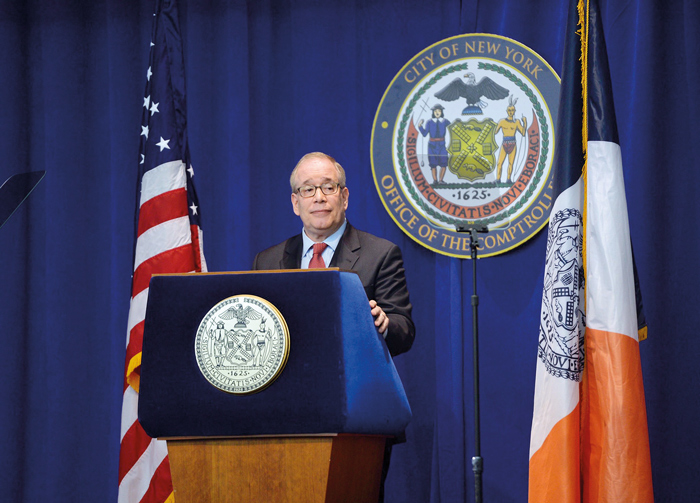Photo Courtesy of Susan Watts/Office of the City Comptroller
“[T]he rights and resources generations of activists fought for should be accessible, clear and mandatory for every single tenant,” Comptroller Stringer said.
By Forum Staff
City Comptroller Scott Stringer on Thursday called for legislation that would mandate inclusion of a Tenant Bill of Rights at every lease-signing to ensure all New Yorker renters are aware of their legal protections upon entering into a housing agreement.
Stringer said the “far-reaching” TBR would require landlords to share with tenants critical information on housing protections, including safeguards related to applications and security deposits; anti-discrimination; heat and hot water access; habitability; rental payments; evictions and renewals, and specific laws related to seniors. According to the comptroller, the proposed Bill of Rights would protect Gotham tenants from unscrupulous landlords by putting the onus on the landlords themselves to enumerate a tenant’s right to live in a safe and sanitary home with a base level of amenities and support.
On Thursday, Stringer offered a draft Tenant Bill of Rights that outlined protections in a straight-forward, reader-friendly flyer. Protections include:
It is illegal for you to be charged a fee for an apartment application beyond a $20 charge to cover the cost of background and credit checks.
Security deposits must be limited to one month’s rent.
You have the right to have your landlord join you in a walk-through inspection to determine the condition of the apartment prior to moving in and out and provide a written agreement documenting all damages even after the lease is signed.
Your landlord has 14 days after you vacate your apartment to provide you with an itemized statement indicating the specific damages and amount of the deposit that they will deduct and the remaining portion of your deposit. If not done within those 14 days, your landlord must return the full deposit amount to you
It is illegal for landlords to discriminate in the rental of housing based on actual or perceived race, creed, color, national origin, gender (including gender identity), disability, age, marital or familial status, the presence of children, lawful occupation, sexual orientation, immigration status, or domestic violence status.
Your landlord must provide you with both hot and cold water. From 6 a.m. to midnight, hot water must register at or above a constant temperature of 120 degrees at the tap, and 110 degrees for tubs or showers equipped with anti-scald valves.
Your landlord has a duty to provide heat and maintain 68°F between Oct. 1 and May 31 (between 6 a.m. and 10 p.m.) when outside temp is below 55°F; and between 10 p.m. and 6 a.m. when outside temp is below 40°F.
Your building must be kept in good repair, including clean hallways and public areas, new apartment paint every three years, and extermination services for any rats, mice, roaches, bedbugs, or vermin. Electrical, plumbing, heating and appliances must be kept in good working order. You are entitled to be free of nuisance or harassment by your landlord or other tenants.
Your landlord has a duty to conduct repairs even if you have complained or taken legal action.
You have a five-day grace period for late rent payment. Late fees are capped at $50 or 5 percent of the monthly rent, whichever is less.
In the case of non-payment proceedings, you have 10 days to appear or file before a default can occur.
Your landlord must seek a court warrant to evict you, and unlawful evictions and attempts to force you to vacate are civil and criminal offenses.
If you are a victim of domestic violence, you may terminate your lease early if not doing so exposes you or your child to substantial risk of physical or emotional harm.
If you or your spouse is 62 years old or older, you are entitled to terminate your lease if you are relocating to an adult-care facility, a residential health care facility, subsidized low-income housing, or other senior-citizen housing.
“Knowledge is power, and the rights and resources generations of activists fought for should be accessible, clear and mandatory for every single tenant,” Stringer said.

